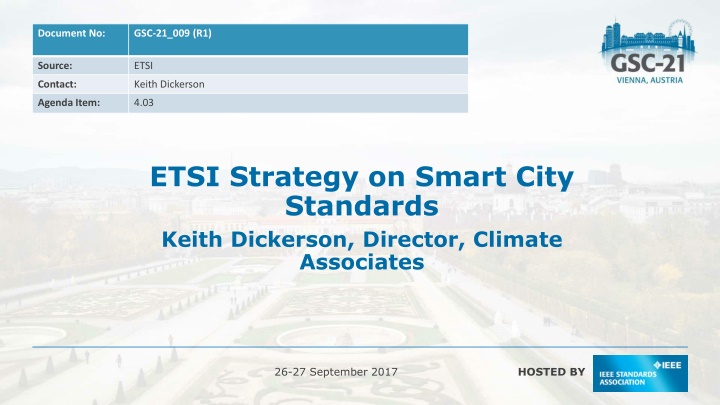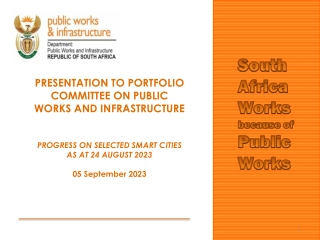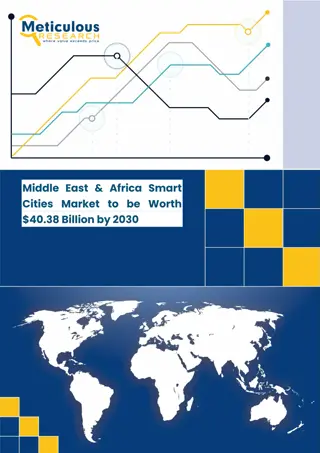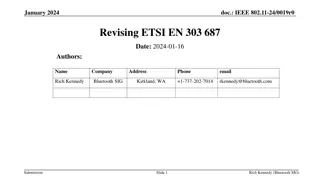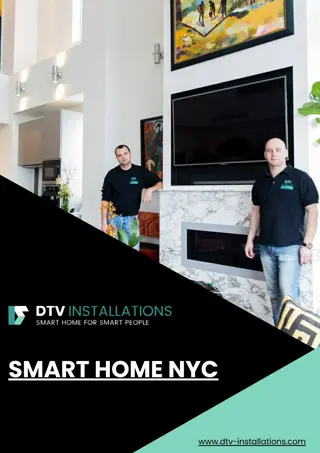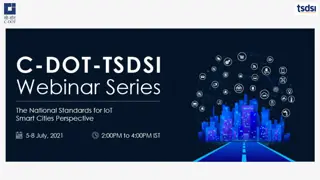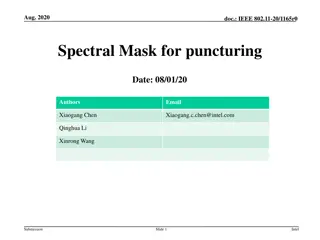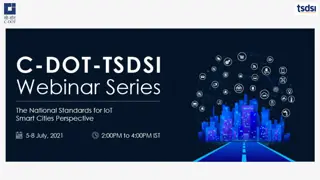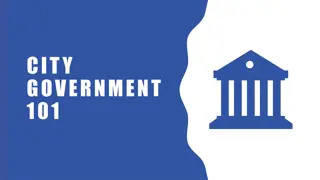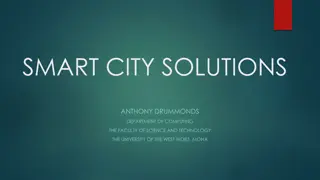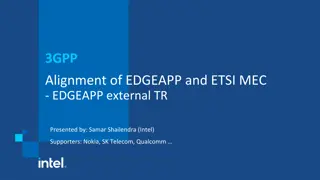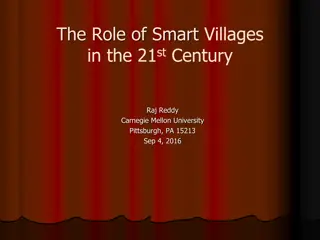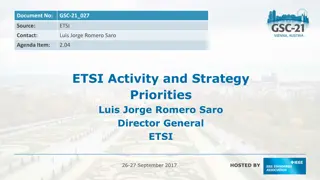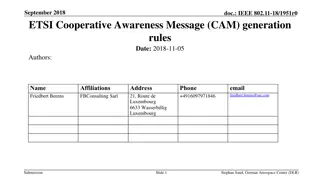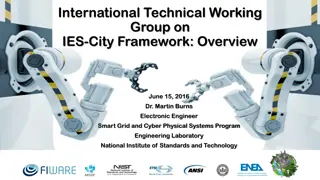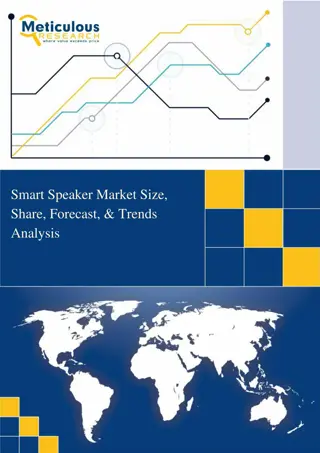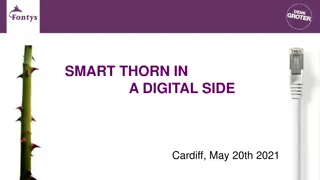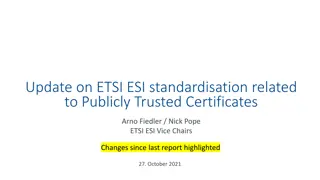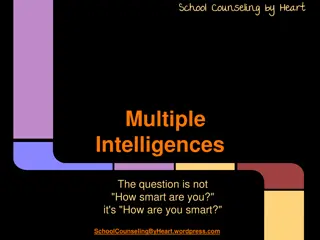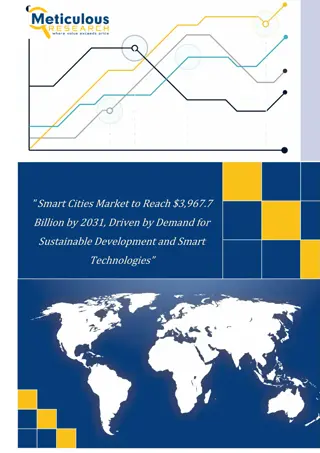ETSI Strategy on Smart City Standards
ETSI's strategy on smart city standards focuses on the needs, technologies, and solutions for smart cities, emphasizing the importance of standards to reduce uncertainty, enable scaling, and mitigate risks in enabling technologies. The document discusses best practices, common use cases, interoperability, and the role of ETSI in supporting smart city initiatives.
Download Presentation

Please find below an Image/Link to download the presentation.
The content on the website is provided AS IS for your information and personal use only. It may not be sold, licensed, or shared on other websites without obtaining consent from the author.If you encounter any issues during the download, it is possible that the publisher has removed the file from their server.
You are allowed to download the files provided on this website for personal or commercial use, subject to the condition that they are used lawfully. All files are the property of their respective owners.
The content on the website is provided AS IS for your information and personal use only. It may not be sold, licensed, or shared on other websites without obtaining consent from the author.
E N D
Presentation Transcript
Document No: GSC-21_009 (R1) Source: ETSI Contact: Keith Dickerson Agenda Item: 4.03 ETSI Strategy on Smart City Standards Keith Dickerson, Director, Climate Associates 26-27 September 2017 HOSTED BY
Scope What do Smart Cities need from Standards? ETSI Groups working on Smart City Technologies ETSI work with External Smart City Groups Further work 26-27 September 2017 Pg 2 |
What do Cities need to Scale up Smart City Solutions? Best Practises Common (Cross-Domain) Use Cases / PoCs and Demos Benchmarking / KPIs Interoperability (infrastructure and data) Unified standards-based Platform Approach Standards (vertical and horizontal) Profiling to allow for gradual deployment of key services 26-27 September 2017 Pg 3 |
Cities need reduced uncertainty to invest Connecting users & services across multiple domains to share information ... a Smart City builds on (standardized) enabling technologies 26-27 September 2017 Pg 4 | Desired city services + Enabling technologies + Business Models Deployment
Standards shrink risks in Enabling Technologies Fixed: xDSL, Fibre, PoF, PLT, NGN, SDN/NFV, co-axial (cable) Wireless: Wi-Fi, Digital Radio, Wide band, Narrow band, LTE -> 5G, Satellite, NFC, RFID Horizontals / Platforms: Security/privacy, Energy efficiency, M2M, QoS/QoE, Interconnect & Interop, Secure IT platform & data management, semantics, Human Factors 26-27 September 2017 Pg 5 |
Smart City-related Groups in ETSI ETSI TC SmartM2M (supporting AIOTI WGs): Developed two releases of M2M specifications. Used as one of the initial baseline proposal for the oneM2M initiative ETSI TC SmartM2M currently working on: Supporting the European industry and institutions on the identification and adoption of standards, in particular regarding the oneM2M framework Bridging the European needs in the area of M2M/IoT towards oneM2M Smart Appliance REFerence ontology SAREF / oneM2M IoT Semantic Interoperability 26-27 September 2017 Pg 6 |
ETSI TC ATTM Working Group on Sustainable Digital Multiservice Cities New Working Group, chaired by eG4U (City of Bordeaux CIO, chairman of the standardization group of EuroCities) Works on deployment of ICT systems, and networks, and sites allowing interactions for data capture (both data consumers and providers) and management of data within each service and between different functions and services and will produce: Standardization work on specific engineering of ICT for Sustainable Digital Multiservice Cities Specifications of topology and functional requirements Specifications of functional and physical characteristics of interfaces Standardization work on operational sustainability management 26-27 September 2017 Pg 7 |
ISG OEU Operational energy Efficiency for Users eG4U (www.eg4u.org): An NGO of ICT users working together to improve Energy Management & Waste monitoring in domains of ICT Sites, Smart Cities and Electrical and Electronic Equipment. ETSI specifications ETSI GS OEU 001 Global KPIs for ICT sites ETSI GS OEU 006 Referential specification to define sustainable levels of ICT Sites ETSI GS OEU 018 Waste management of ICT equipment ETSI TS 105 174-2 Broadband Deployment and Energy Management; Part 2: ICT sites 26-27 September 2017 Pg 8 |
ETSI Human Factors Task Force - Working on standards requirements of users / citizens living in and interacting with the smart city. - For example, activities related to accessibility of mobile devices having a direct impact on the user experience in smart cities (e.g. accessibility of intelligent transport information for the blind or visually impaired). - 3 new work items arising from CEN/CLC/ETSI SSCC-CG requirements on accessibility. - Proposed STF awaiting evaluation for funding by EC. 26-27 September 2017 Pg 9 |
ETSIs Smart City Cooperation Initiatives ETSI is active in and/or cooperating with: SF-SSCC: CEN-CENELEC-ETSI Sector Focus - Smart and Sustainable Cities and Communities (ISO, IEC, UN, ITU-T..) + SM-CG + SEG-CG AIOTI www.aioti.eu: WG3 (IoT Standardization) and AIOTI WG08 (Smart Cities) with many SDOs (ITU-T, W3C, IEEE, ISO, IEC, JTC1, ETSI, oneM2M, 3GPP..), OSS, Industry/Verticals and IoT Alliances, IERC, IoT-EPI, IoT LSPs FIWARE / OASC.. in the new ISG CIM (next slide) ETSI is a partner in the H2020 Smart City project ESPRESSO (OGC, CITYKEYS/Eurocities, Sharing Cities, EIP-SCC, Urban Platforms), IoT-EPI/UNIFY-IoT and IoT LSP CSA CREATE-IoT 26-27 September 2017 Pg 10 |
Cross-cutting Context Information Management for Smart City Interoperability User Apps Open Data Stakeholders Public Authorities Context Information Models EXAMPLE: Citizen Complaints Photo-App Application Context Information Management Applications Data Applications CIM-API [JSON-LD] CIM-API [JSON-LD] Publication Platforms Mca Linked Data experts Information Systems Smart City organisations OpenSource developers IoT System Integrators Citizens! Goal = interoperable exchange of data & metadata between systems Pg 11 | 26-27 September 2017
ETSI involvement in I-ES City Project (NIST) ETSI and NIST have signed a partnership agreement (early 2016) to explore opportunities for cooperation in the domains of Smart Cities and IoT (Internet of Things) ETSI hopes that through this collaboration with NIST and other partners we may encourage global cooperation and knowledge sharing as well as the development of global technical specifications and recommendations to help accelerate the numerous Smart City deployments around the globe. Three workshops in both US and Europe have progressed the work on identifying potential Pivotal Points of Interoperability (PPIs) between numerous IoT frameworks https://pages.nist.gov/smartcitiesarchitecture/ 26-27 September 2017 Pg 12 |
Are other initiatives required? Key Issues on Smart Cities (as identified in ETSI IoT week - November 2016): Lack of guidance for Cities wishing to make RFPs for Smart City projects Complexity and fragmentation of Standards Long time-scales for introduction of smart city services Need to address concerns about Security, Privacy and Trust Data Semantics and interworking Possible ways forward: Define a smart city RFP template Define a roadmap for introduction of smart city services Bring together major IoT and city stakeholders Host regular showcases of smart city trials/demos/PoCs, identify best practicies Hold Plugtests on interoperability of smart city services Encourage different standards groups to work together to avoid fragmentation and confusion to the City users 26-27 September 2017 Pg 13 |
Thank you For more information, please contact: Keith Dickerson keith.dickerson@mac.com David Boswarthick David.Boswarthick@etsi.org Affiliation Name: ETSI www.etsi.org 26-27 September 2017 Pg 14 |
Background slides 26-27 September 2017 26-27 September 2017 Pg 15 |
oneM2M Partnership Project Work Process Over 200 member organizations in oneM2M www.oneM2M.org All document are publically available 26-27 September 2017 16
Work Process Key findings/trends City 2.0 Smart city platforms bring significant efficiencies when the number of applications grows Shared data Single API set and data formats are beneficial for developers Initial cost of platform investment tends to be marginal compared to economies of scale, OPEX options can alleviate initial costs Connectivity, plenty to chose from Machine learning and analytics create great benefits (e.g. traffic management, parking management) Living labs for research and innovation Open standards are crucial for sustainable success 26-27 September 2017 17
Work Process Key findings/trends City 2.0 2. Digitalize and sensorise 3. Build Dashboards 1. Build a vision 4. Expand the vision, Integrate and Innovate Source: Based on discussions with Dr. Martin Serrano, OASC and Insight centre 26-27 September 2017 18
